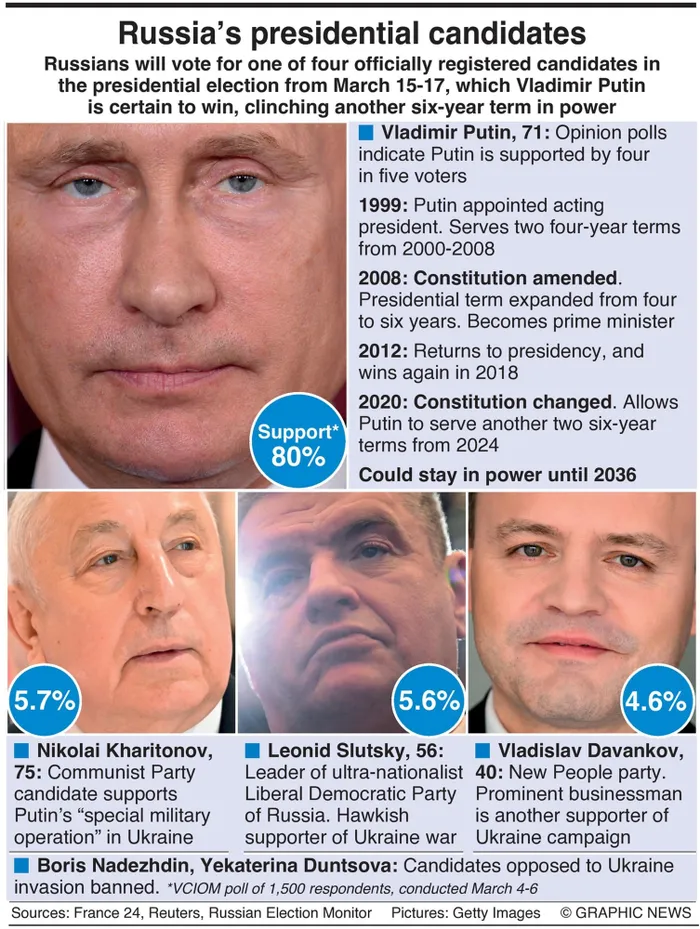Attacks foiled as voting starts

Russia will vote for one of four officially registered candidates in a presidential election on March 15-17, which Vladimir Putin will surely win, clinching another six-year term in power. Graphic shows Vladimir Putin and his three presidential contenders. Image: Graphic News Ltd / March 12, 2024
Russia's Central Electoral Commission (CEC) head Ella Pamfilova speaks at the opening of the CEC Information Centre in the run-up for the presidential election in Moscow on March 14, 2024. Picture: / AFP
By AFP and Sputnik
As millions of Russians headed to the polls yesterday to elect a president, Moscow said it had repelled all attempts by pro-Ukrainian fighters to capture territory in its border regions, following an increase in attacks this week.
Pro-Ukrainian militias – made up of Russians who oppose the Kremlin and have taken up arms for Kyiv – launched a wave of guerilla-style attacks, claiming to have seized the village of Tyotkino in the Kursk region in Russia.
“Control over the village has been fully restored,” the defence ministry said in its statement, conceding that Russian forces had temporarily lost control over territory.
Moscow also said it had detained a Russian citizen on treason charges for allegedly launching drones near military facilities to interfere with Russian air defence systems.
The attacks came as President Vladimir Putin seeks to extend his term in office by another six years in a presidential election the Kremlin says will show that the country is fully behind his assault on Ukraine.
Early voting in the election, the eighth in the nation’s modern history, commenced on February 25.
This enabled Russian citizens who were unable to physically visit regular polling stations due to living or working in extreme or hard-to-reach locations to cast their ballots until March 14. Citizens living abroad began heading to the polls on March 1.
The main event in the elections is being held this weekend throughout Russia as well as at sea, encompassing the nation in its entirety from the Far North, to the special military operation zone and Russia’s new regions and even aboard ships in the Sea of Okhotsk.
Mobile polling stations have been strategically placed near the special operation zone, covering the areas of Donetsk, Lugansk, Zaporozhye, Kherson, Belgorod, Bryansk, and Kursk, as well as Crimea.
Voter turnout for the 2018 presidential election was 67.5 percent. This year, the turnout is expected to be at 71 percent, the Russian Public Opinion Research Centre predicted.
The president of the Russian Federation is elected for a term of six years. The election is held in the single federal electoral district that comprises the entire territory.
The Russian Federation Council, or upper house of parliament, designated tomorrow as the day of the election. The Russian Central Election Commission (CEC) subsequently announced that the voting would take place over three days, something that was introduced during the Covid-19 pandemic and well-received by voters.
E-voting
This time around, a remote electronic voting system is being used for the first time to elect Russia’s president, according to a decision made by the CEC.
Voters in 29 Russian regions will be able to cast their ballots remotely.
Online e-voting will be available in the capital and the Moscow region, in the Altai, Arkhangelsk, Belgorod, Chelyabinsk, Chuvash, Kaliningrad, Kaluga, Kamchatka, Karelia, Kursk, Lipetsk, Murmansk, Nenets, Nizhny Novgorod, Novgorod, Novosibirsk, Perm, Pskov, Rostov, Sverdlovsk,
Tomsk, Vladimir, Vologda, Voronezh, and the Yaroslavl regions, as well as in Crimea and Sevastopol.
Mobile Voting
The Mobile Voter mechanism gives Russian citizens the opportunity to vote at a polling station different from the one based on their home address. The system also enables citizens to vote online, unless this option is unavailable in a certain region of the country. In both cases, an official application has to be submitted.
Russian citizens have submitted more than five million applications to vote through the mobile voter system, and more than four million applications to vote remotely, said CEC head Ella Pamfilova.
Election State Automated System
The election state automated system is information software that ensures that the ballots are counted in an accurate and rapid manner. The system facilitates the process at all stages, including planning and preparation, registration of voters, processing details about the candidates, carrying out the voting, as well as its summarising and final statistical processing.
Who’s running for president?
There are four candidates vying for the top office:
- Self-nominated candidate and incumbent President of the Russian Federation Vladimir Putin.
- Communist Party of the Russian Federation nominee Nikolai Kharitonov.
- Liberal Democratic Party of Russia nominee Leonid Slutsky.
- New People party nominee Vladislav Davankov.
All candidates running in the presidential race have higher education qualifications, with Putin specialising in law, Davankov in history, Slutsky in management, and Kharitonov in agrarian studies. In terms of academic degrees, Putin and Kharitonov hold doctorates in economics, Kharitonov also holds one in sociology, while
Slutsky is a doctor of economics. While Slutsky and Davankov are newcomers to the presidential race, the two other contenders have prior experience in running for the nation’s top office. Putin has participated in four presidential elections, while Kharitonov threw his hat into the ring in 2004.

Election observers
More than 200 parliamentary observers have been accredited, in addition to dozens of electoral experts. Delegations of international observers from 36 countries are in Russia, including those from 30 national parliaments, as well as from five international organisations.
Among them are the CIS Inter-parliamentary Assembly of Member Nations, the Parliamentary Assembly of the Collective Security Treaty Organisation, the Asean Inter-Parliamentary Assembly, the Organisation of Islamic Co-operation, and the Central American Parliament. – AFP and Sputnik
Related Topics: